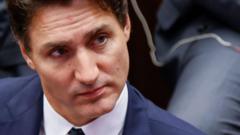In what has been deemed one of the most turbulent weeks of his time in office, Canadian Prime Minister Justin Trudeau sought to project strength and unity at the Liberal Party's annual holiday celebration. This gathering took place just a day after the unexpected resignation of Finance Minister Chrystia Freeland, a key ally. Despite calls from party members for him to resign, Trudeau adopted a defiant stance, referencing recent challenges as akin to familial disputes and urging his party to be both ambitious and audacious in confronting adversity.
Political commentators noted that his speech bore similarities to a campaign address, suggesting that Trudeau is digging in despite the potential for an imminent election. His determination has been further underscored by the New Democrat Party (NDP), led by Jagmeet Singh, indicating plans to introduce a motion to unseat Trudeau's government in the coming year. While the NDP's support has been critical to maintaining the Liberal government's position, Trudeau's reluctance to consider resignation hints at his intent to fight on, even as he takes time over the winter break to ponder his next steps.
Trudeau's history of defiance amidst challenges has often been a hallmark of his leadership. Critics once labeled him as "just not ready" during his initial campaign against Conservative Prime Minister Stephen Harper. However, the younger Trudeau proved resilient, capturing a majority government in 2015 and becoming synonymous with a brand of leadership characterized by self-confidence and charisma—traits inherited from his father, former Prime Minister Pierre Elliott Trudeau.
Despite securing re-election twice and becoming the longest-serving G7 leader, Trudeau's tenure has not been without controversy. His government has faced a series of scandals, ranging from allegations of political interference involving former Justice Minister Jody Wilson-Raybould to damaging images from his past depicting him in brownface. Nevertheless, Trudeau's ability to survive these setbacks has fortified loyalty within the Liberal Party, despite growing dissent among party ranks.
Currently, a dwindling approval rating presents significant hurdles; approximately two-thirds of Canadians disapprove of Trudeau, and internal pressures have led to calls from at least 18 Liberal MPs for his resignation. New Brunswick MP Wayne Long voiced concerns that Trudeau's leadership is no longer sustainable and that a shift in direction is necessary for the party's future.
Political observers draw parallels between Trudeau's challenges and those faced by Joe Biden in the U.S., particularly regarding the significance of how he chooses to exit the political stage. With historical precedents set by his father who stepped down in the face of declining popularity, Trudeau's next steps remain uncertain. As he contemplates his future amidst the holiday season, the potential for change looms large in Canadian politics, with eyes keenly watching for the next chapter in Trudeau's narrative as Prime Minister.



















